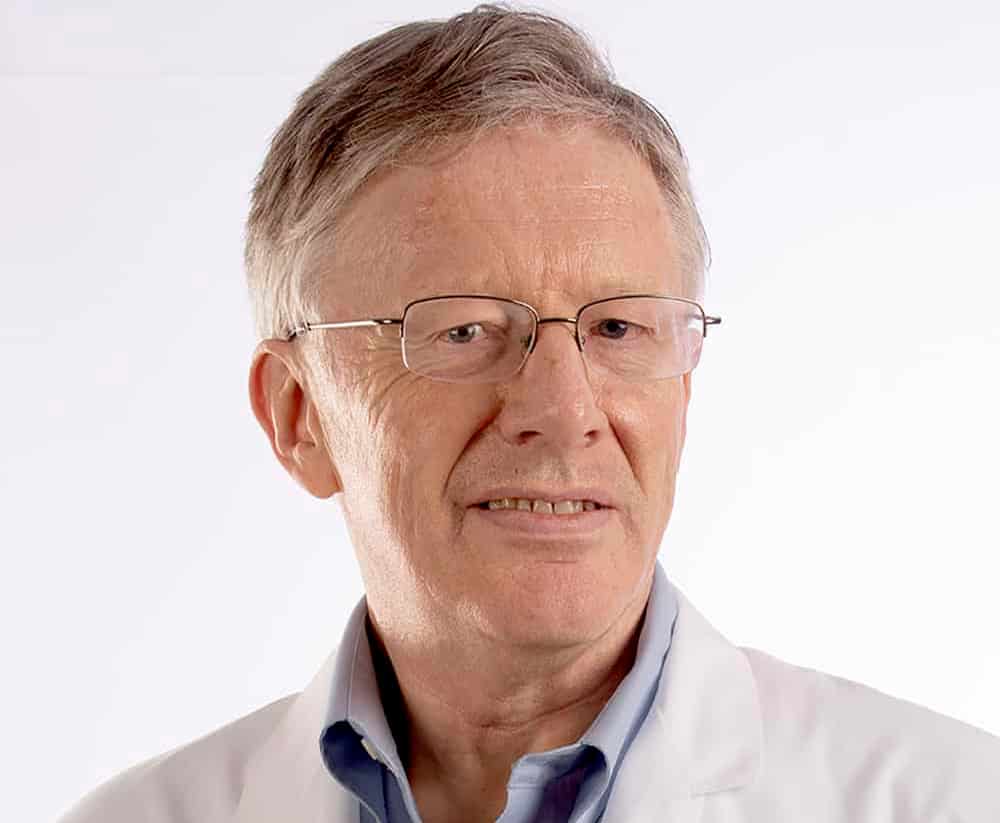View Larger Image

Guido J.K. Tricot, M.D., Ph.D.
Former UAMS Physician, Renowned for Introducing Benchmark Chemotherapy, Returning to Myeloma Center
| LITTLE ROCK — Guido J.K. Tricot, M.D., Ph.D., has rejoined the University of Arkansas for Medical Sciences (UAMS), and will see patients at its Myeloma Center. While at UAMS previously, Tricot developed one of the most effective first-line therapies for multiple myeloma, now used around the world.
“We are thrilled to have Dr. Tricot rejoin our team,” said Frits van Rhee, M.D., Ph.D., clinical director of the Myeloma Center. “His vast expertise and experience with cutting-edge research will be invaluable to us,” he said. “He will absolutely help us in furthering the innovative treatment we have offered here for the past three decades.”
When Tricot, a hematologist originally from Belgium, was first at UAMS, he was intimately involved in developing and pioneering the Total Therapy Approach to myeloma involving induction chemotherapy, stem cell transplantation consolidation, and maintenance. This treatment method has been adopted worldwide and has been responsible, together with the introduction of novel drugs, for the greatly improved median survival rate for myeloma exceeds 10 years, with some patients achieving cure.
“When I left UAMS in 2007, the program here was the largest myeloma program in the world,” Tricot said. “Many of us worked hard to build the myeloma program here into something unique.”
Tricot received his medical and doctoral degrees at the University of Leuven in Belgium and later served on the faculties of the Division of Hematology/Department of Medicine at University of Leuven, and the Department of Medicine and Pathology at Indiana University in Indianapolis, Indiana.
He initially practiced at UAMS from 1993-1997, then returned in 2000 to serve as director of clinical research for myeloma. In 2007, Tricot left UAMS to launch the Utah Blood and Marrow Transplant and Myeloma Program at the University of Utah’s Huntsman Cancer Institute.
In 2012, he joined the Holden Comprehensive Cancer Center at the University of Iowa Health Care in Iowa City, Iowa, where he most recently worked as an emeritus professor of internal medicine with hematology, oncology and blood and marrow transplantation. Through the past 20 years, Tricot researched multiple myeloma and treated thousands of myeloma patients
During retirement, Tricot has continued collaborating with his research team, working to defeat drug resistance, prevent relapse, and lengthen life expectancy.
“Even with the most intensive therapies for myeloma, many patients still relapse, indicating that there is a small fraction of myeloma cells very resistance to chemotherapy,” Tricot said.
UAMS is the state’s only health sciences university, with colleges of Medicine, Nursing, Pharmacy, Health Professions and Public Health; a graduate school; a hospital; a main campus in Little Rock; a Northwest Arkansas regional campus in Fayetteville; a statewide network of regional campuses; and eight institutes: the Winthrop P. Rockefeller Cancer Institute, Jackson T. Stephens Spine & Neurosciences Institute, Harvey & Bernice Jones Eye Institute, Psychiatric Research Institute, Donald W. Reynolds Institute on Aging, Translational Research Institute, Institute for Digital Health & Innovation and the Institute for Community Health Innovation. UAMS includes UAMS Health, a statewide health system that encompasses all of UAMS’ clinical enterprise. UAMS is the only adult Level 1 trauma center in the state. UAMS has 3,275 students, 890 medical residents and fellows, and five dental residents. It is the state’s largest public employer with more than 12,000 employees, including 1,200 physicians who provide care to patients at UAMS, its regional campuses, Arkansas Children’s, the VA Medical Center and Baptist Health. Visit www.uams.edu or uamshealth.com. Find us on Facebook, X (formerly Twitter), YouTube or Instagram.###